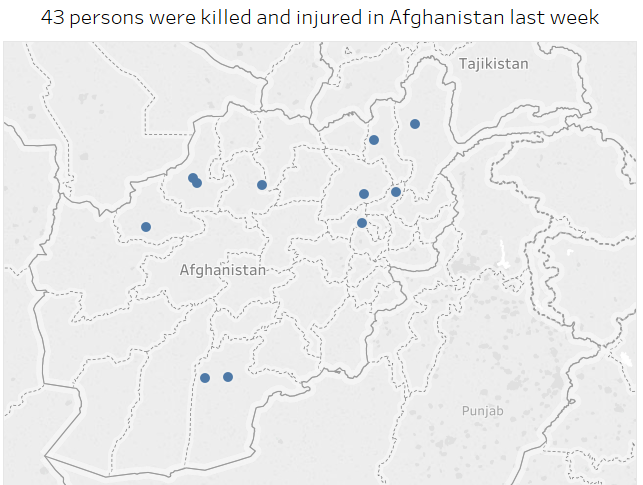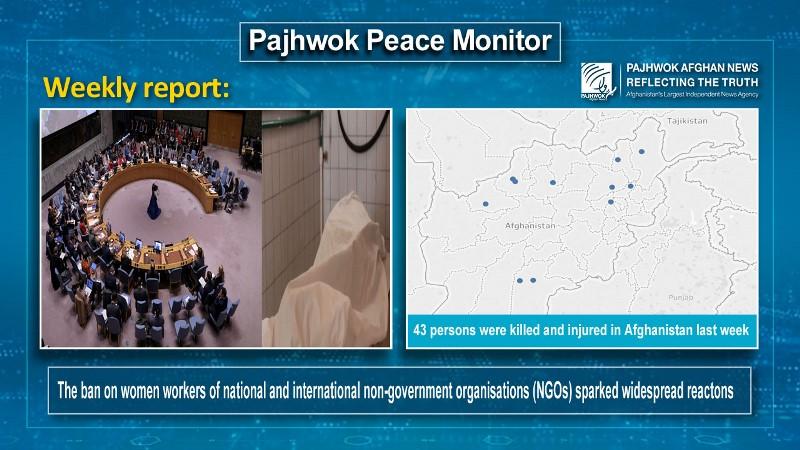KABUL (Pajhwok): The ban on women workers of national and international non-government organisations (NGOs) sparked widespread reactons but some officials of the caretaker government say religious scholars are striving to resolve the issue.
Last week’s key events
- Ban on women workers of NGOs until further notice
- Reactions to curns on women workers — decision should be reversed
- The UN aid chief to visit Kabul for talks with the caretaker government
- The decision draws domestic and foreign reactions
- Dilawar: Clerics looking for Sharia-based solution
- Potzel: Western states should reopen embassies in Kabul
- Faiq: Potzel remarks disappointing
- Afghan embassy: Afghan nationals yet to be freed despite promises
Casualities
Last week, at least 29 people were killed and 14 others wounded in different incidents across the country.
The Ministry of Defence on Tuesday confirmed the killing of 20 “Resistance Front” fighters, including two commanders, in clashes with security forces in the Andarab district of northern Baghlan province.
Reports said the Badakhshan police chief and two other security personnel were killed in an explosion near the gate to the police headquarters.
Unidentified gunmen shot dead one individual in Faryab, while the brother of the deputy education head for Qades district were killed in Badghis province. The body of a girl stangled to death was found in Kandahar province, and a woman in Sar-i-Pul killed her drug-addicted husband.
Local officials say four civilians were injured in an explosion in Takhar. Four security personnel were injured in Panjsher and Parwan. One child was killed and three more were wounded after an unexploded rocket shell went off in Kandahar. Two children were injured in similar blast in Faryab.
Note: Casualty figures are based on reports available with Pajhwok. Some reports about such incidents might not have reached the news afency or serouce may not have provided exact figures.

At least eight people were killed in different incidents of violence in the country last week.
Last year, before the regime change in the country, hundreds of civilians and individuals from the warring fron sides were killed and injured in violent incidents and clashes.
Ban on women workers of NGOs
On Dec 24, the Ministry of Economy (MoE) asked all national and international NGOs to send their female employees home until further orders.
The ministry said it had received “serious complaints” that women working in NGOs were not observing a proper Islamic dress code, a charge used by authorities to justify the ban on university education.
The ban on women drew strong reactions, with the United Nations, the US, Norway, Denmark, the United Arab Emirates, Bahrain, France, Italy, Japan, Switzerland, the Netherlands, the United Kingdom, Germany, Australia, Canada, Save the Children, the European Union, the United Nations Security Council, the United Nations Population Fund, Doctors Without Borders, Amnesty International and the International Committee of the Red Cross denouncing the ban on female NGO workers.
Some of them urged the caretaker government to reverse the decision while others warned the move would negitavely impact humanitarian assistance delivery to the Afghans.
In reaction to the government decision, Save the Children, the Internatioanl Rescue Committee, the Norwegian Refugees Council (NRC), World Vision and CARE announced suspending their operations in the country.
US Chargé d’Affaires Karen Decker tweeted: “As a representative of the largest donor of humanitarian assistance to Afg, I feel I have the right to an explanation of how the Taliban intend to prevent women & children from starving, when women are no longer permitted to distribute assistance to other women & children.”
Responding to the comments from the US diplomat, Mujahid tweeted: “We do not allow anyone to talk rubbish or hurl threats at the IEA over its decisions in the name of humanitarian aid.”
He said all NGOs operating in Afghanistan were obliged to act in accordance with its laws and accept IEA decrees.
UN humanitarian chief Martin Griffiths will visit Afghanistan in the coming weeks after the caretaker government barred women from working for NGOs.
Acting Mines and Petroleum Minister Shahabuddin Dilawar says religious scholars are trying to find a way for women to work for NGOs in light of Sharia and Afghan traditions.
He said religious scholars were looking into the matter to find a solution in line with Sharia and national values.
In Badghis, a number of religious scholars gathered in support of the government decision barring women from working for NGOs.
Prior to this decision, the Ministry of Higher Education also banned women from university education until further notice.
Administrative Reforms and Civil Services Department head Maulvi Abdul Hanan Arifullah on Thursday said the caretaker government was not against education and universities would certainly reopen.
Reopening of foreign embassies
UN Secretary-General’s Deputy Special Representative for Afghanistan Markus Potzel asked western countries to reopen their embassies in Kabul.
Afghanistan’s Chargé d’Affaires to the United Nations Naseer Ahmad Faiq slammed UNAMA Deputy Head Markus Potzel’s remarks regarding the reopening of western embassies in Kabul as disappointing.
Jan Egeland, head of the Norwegian Refugee Council (NRC), urged the West to engage with the Islamic Emirate.
Pakistani and Turkish foreign ministers held a telephonic conversation, in which the two sides discussed the situation in Afghanistan and other issues.
Russia and India are ready to help revive ‘intra-Afghan talks’ if the caretaker government wants so, Moscow’s special representative for Afghanistan Zamir Kabulov says.
Interest in investment
A representative of China’s Chamber of Commerce, during a meeting with Da Afghanistan Breshna Sherkat (DABS) head, said his country was ready to invest in Afghanistan’s energy sector and generate 500 megawatts of electricity from coal.
Iran is also ready to invest in mining, power and railway sectors in Afghanistan, says the new acting ambassador of the neighboring country.
In a statement, the Ministry of Foreign Affairs said Iran’s special representative and new acting ambassador Hassan Kazimi Qomi called on Foreign Minister Amir Khan Muttaqi on Monday.
Mullah Abdul Ghani Baradar, deputy primw minister for economic affairs, said the government was ready for any kind of cooperation on investments in mining, energy and agriculture sectors.
Assistance
Last week, Uzbekistan sent 170 tonnes of humanitarian aid to Afghanistan for the needy Afghans.
Refugee problems
The Afghan embassy in Islamabad says despite promises by Pakistani institutions and officials, the Afghans arrested in that country, including women and children, have not been released.
In December, the Afghan embassy in Islamabad said 500 of 2,000 detained Afghans were released in Pakistan over the last three months. Pakistani officials had promising facilitating the release of other Afghans, a probleme that remained unaddressed, according to the embassy.
At least 1,200 Afghan nationals, including women and children, have been arrested by Pakistani police in multiple raids in Karachi and other cities.
The Islamic Emirate urged Tehran to realase Afghan prisoners and resolve bank account-related problems of refugees in the neighbouring country.
The Ministry of Refugees and Repatriation said a joint technical committee would be formed between the two countries to solve the problems of the Afghan refugees in Iran.
According to the ministry, around seven million Afghans are currently living as refugees in different states, including three million in Iran, as many in Pakistan and thre rest in other countries.
sa/mud







GET IN TOUCH
NEWSLETTER
SUGGEST A STORY
PAJHWOK MOBILE APP